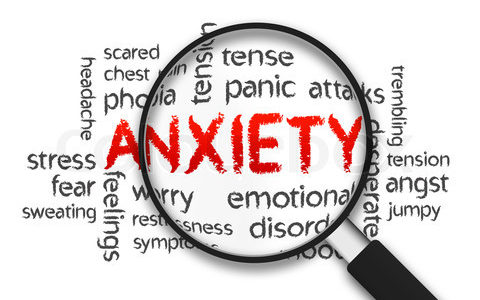Anxiety

When I think about anxiety, I think that it is something along the lines of worrying and feeling afraid. It can actually be described as a feeling of unease, and examples of this can be feelings of worry and fear that can be mild or severe.
Feelings of anxiety are not uncommon, and everyone experiences them at some point. Events such as taking an exam or going for a job interview can cause worry and this is normal to have. However, it is when those feelings become difficult to control and are a constant in a person’s life, where they affect them daily, that it needs to be looked into by a GP.
Anxiety is the main symptom of various conditions such as post-traumatic stress disorder (PTSD), phobias, panic disorder, and social anxiety disorder. There is also a specific condition called Generalised Anxiety Disorder (GAD) which is a long-term condition where a person feels anxious about many different things instead of one specific event. This condition is common and affects up to 5% of the population in the UK. Slightly more women than men are affected by it, and it is more common in people who are between the ages of 35 and 59 years old.
People who have GAD feel anxious most of the time and may struggle to remember when they last felt relaxed. Psychological and physical symptoms may be caused by the condition, such as a person feeling worried and restless, experiencing dizziness, having heart palpitations, and having trouble sleeping or concentrating. Other physical symptoms may include having increased muscle tension, having difficulty breathing, feeling sick, perspiring more, having a dry mouth, and experiencing hot flushes. Common psychological symptoms include a person thinking that may lose control or that they might die, feeling as though people are looking at them or that things are speeding up/slowing down, wanting to run away/escape from a situation, feeling detached from an environment and the people in it, and feeling on edge and alert to everything that is around them.
Avoidance is the most common behavioural symptom of when someone is feeling anxious – avoiding the situation can create immediate relief but it not a long-term solution because the anxiety will most-likely return the next time such a situation is faced.
The cause of GAD is not fully known and some people may develop the condition through no apparent reason. Conversely, a combination of several factors are seen to play a role in it, such as genetics, having a history of experiencing stressful or traumatic experiences, an over activity in the areas of the brain that are involved in emotions and behaviour, an imbalance of the brain chemicals noradrenaline and serotonin which are involved in controlling and regulating a person’s mood, having a history of misusing drug or alcohol, and having a painful long-term health condition.
Depending on what causes anxiety for a person, it may cause them to not seek help for it. Having someone come along to a GP appointment for support may be a solution. However, if going to a GP surgery is not something that can be done, a doctor may be able to offer a home visit or an assessment over the phone. There are always options and I think it’s best to see what else can be done. Pretending it isn’t happening is never the solution.
Sarah Keeping MBPsS MSc PgDip GDip BA (Hons)
Follow Sarah on twitter at @keepingapproach
References
https://www.nhs.uk/conditions/generalised-anxiety-disorder/
https://www.anxietyuk.org.uk/get-help/anxiety-information/



